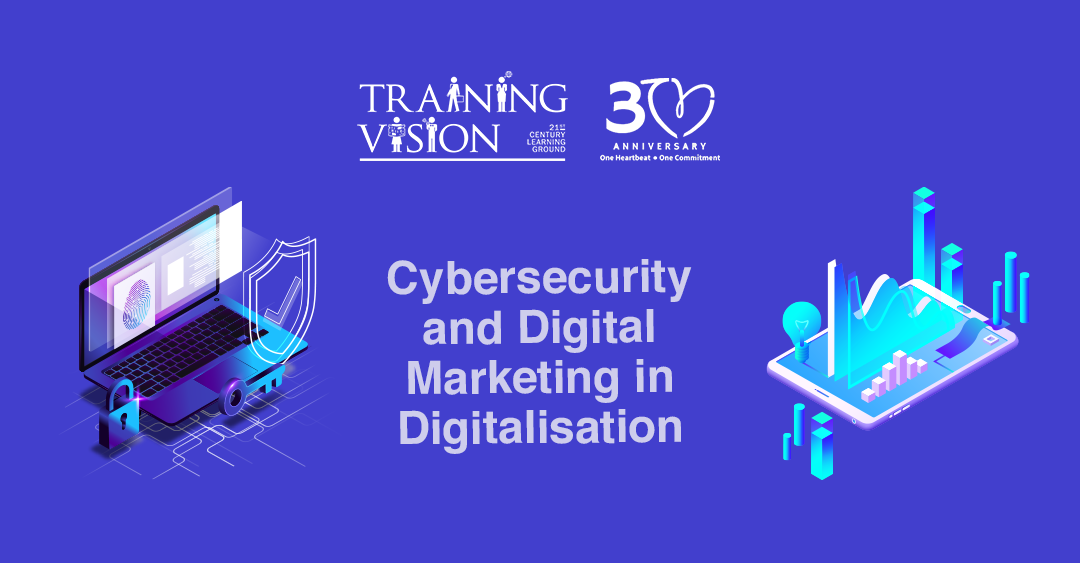A few years ago, some business owners were still having second thoughts and wondering if digitalisation is truly a necessity for their businesses. These doubts must have been suppressed over the past couple of years as we experienced a global health crisis. As we are all forced to stay home, businesses need to take major steps and undergo major disruption in order to stay relevant in their respective industry. Transactions are now done online, products are sold in virtual shopping stores, and advertisements are flashed on our mobile phones.
We have reached the era where pretty much everything is done online. Digital transformation is bound to happen regardless of whether we like it or not, and the pandemic just rushed it up. While businesses are following each other’s suits, they are also considering the two major business essentials in digitalisation—digital marketing and cyber security.
Digital Marketing
The concept of digital marketing has been there ever since the invention of the internet. E-commerce boomed over the years and it wasn’t a threat to the physical stores until a few years ago and is one of the major effects of Covid-19 in businesses. Online transactions offered convenience, thus people spend more time on the internet than ever, and the consumption of digital content significantly increased. Many organisations took advantage of this, making their digital marketing strategies much stronger for the benefit of their business.
The power of social media proved to be the digital marketers’ advantage as well. After all, it is the best way to reach their target audience. While people initially signed up for Facebook, Instagram, and Tiktok to connect with friends and engage themselves in social interactions, they are also there to check out new products, read reviews, and see how brands interact with their consumers as well as their competitors.
Cyber Security
Cyber security used to be an industry focused on government agencies and financial institutions. However, the flourishing digital economy paved the way for it to be an essential part of the digital transformation across all industries. All businesses, big and small, are highly recommended to implement cyber security measures. As everything else transforms into digital, a huge amount of sensitive data is transmitted back and forth through the internet. These data can be intercepted by cyber hackers, resulting in unfavourable outcomes.
Cyber security attacks can be expensive (PDPA, the costs of loss and other damages, etc.), and so there is not enough reason for organisations to impede their cyber security programme especially if most of their business transactions are done online, and they hold sensitive information of their clients, products, and services (finance, health, and retail industries).
The Importance of Cyber Security in Digital Marketing
While cyber security systems should cover the entirety of business operations, from backend to frontend, one of the most crucial aspects of business that needs heightened security is digital marketing. Not many people are aware of this, but cyber security and digital marketing go hand in hand.
Here are some of the aspects of digital marketing that need cyber security:
Website
The website is the most essential aspect of a digitalised business. In digital marketing, websites are where blog posts can be seen and read by the consumers–content on why they need a product in their everyday lives, or how a service changed someone’s life. It is where Google takes the consumer if they look up a brand on the internet.
It is the place where people check out products, read reviews, and find more information about the brand. In the retail business, it is basically the online version of the physical store where people enter their name, email address, birth date, and credit card information to buy a product or avail of a service.
There is no wonder that websites are heavily targeted by cyber hackers. They can flood your website with an enormous amount of traffic that can potentially break your server and your website, infiltrate the data that is being entered on the website, and steal sensitive information from your database. There are a lot of malicious activities that can happen which makes cyber security a necessity.
Email Marketing
Email marketing is probably the oldest form of digital marketing, but it still proves to be one of the most effective ways to promote a business. Unfortunately, this is also the favourite method of cyber hackers in delivering malware. They simply imitate the email format from legitimate organisations and the type of attack will depend on the kind of information they received.
This is crucial for digital marketers because they frequently interact with potential customers and even with hackers disguised as customers. Cyber security awareness, along with training on how to spot a phishing email is recommended to come into play. Installing spam filters in the email system can also help in keeping these kinds of threats at bay.
Social Media
With more than 2 billion active users per month, Facebook is the most famous social network worldwide, followed by Instagram with 1.2 billion active users per month. With this number of people on social media, marketing on these platforms could be just an easy feat. Sadly, these platforms can also be infested by hackers waiting to attack. Social media accounts for business is more vulnerable than personal ones simply because there are multiple people accessing the account and they share the login information.
Social media accounts need to be kept safe from cybercriminals, especially these days when the platforms have started adding shopping features to their sites (e.g. Facebook Marketplace). Plus, these hijackers cannot just steal information from the accounts – they can also get hold of the login credentials and upload offensive content on the pages and demand payment to stop the harassment. It can be a much more expensive event compared to getting a social media management tool to handle all social media tasks and educate the marketing team about the potential danger brought by unsolicited social media messages, especially those that contain links.
CRM Software
CRM (Customer Relationship Management)software is important in digital marketing – it is used to collect data from the customers, analyse it, and come up with an effective digital marketing strategy through it. Sometimes, it is used to automate some of the digital marketing activities. As it contains customer information, you wouldn’t want the hackers to get access to your CRM software. It is going to be an expensive scenario, plus, you could lose the reputation of your business.
While breaches frequently happen inside the job, careless mistakes can also occur. Access to the CRM software should be limited to certain employees, and tracking tools should be used whenever someone logs in to the system. These can also be performed by the cyber security team as well.
Customer information is precious
Obtaining customer data is an important aspect of digital marketing. One might think that these are just numbers, but when interpreted, they are highly valuable to the company. Having knowledge of consumer behaviour, and obtaining the information about what they want and what they need, the company can strategise well so that these consumers can be transformed into actual customers. This is the reason why digital marketers are one of the sought-after professionals in any given industry. The digital transformation also created the need for digital marketing.
The Risk of Brand Damage
Cyberattacks are not just expensive, it also has the great risk of damaging your brand. It also has significant effects on consumer perception. If you experience a cyberattack that shut down your website (DDoS – Distributed Denial of Service), potential customers might think twice about patronising your brand and doubt your overall competence. Besides, who would want to provide their personal information to an institution that does not have the capability to take care of it?
Keep in mind that not all social media hackers are after the money. Some of them just find a thrill in destroying brands by hijacking their business profiles, uploading obscene materials to the page, and even sending offensive messages to potential customers. Granted that this is not the company’s own doing, but it essentially allowed it to happen because of the lack of cybersecurity measures.
Digital marketing is powerful in so many ways. It can influence the consumer, guide them to the products and services that they need, provide them with a personal connection, and make the consumer feel empowered. It is likewise dangerous because as a digital marketer, you are also a guardian of sensitive data which can make or break your brand. Fortunately, you can avoid the dangerous side by working with cyber security professionals.
If you are interested in becoming a digital marketer, sign up for our Professional Diploma in Digital Marketing & Campaign Strategy and learn the highly industry-relevant digital marketing skillsets that are immediately transferable to the workplace.
If you are more on the protective side and would rather be at the backend, our Advanced Diploma in Cyber Security (Advanced Standing) is for you. Signing up for this course will provide you with foundational knowledge in info-comm technology and cyber security training that can help you kickstart a career in the realm of modern technologies.








